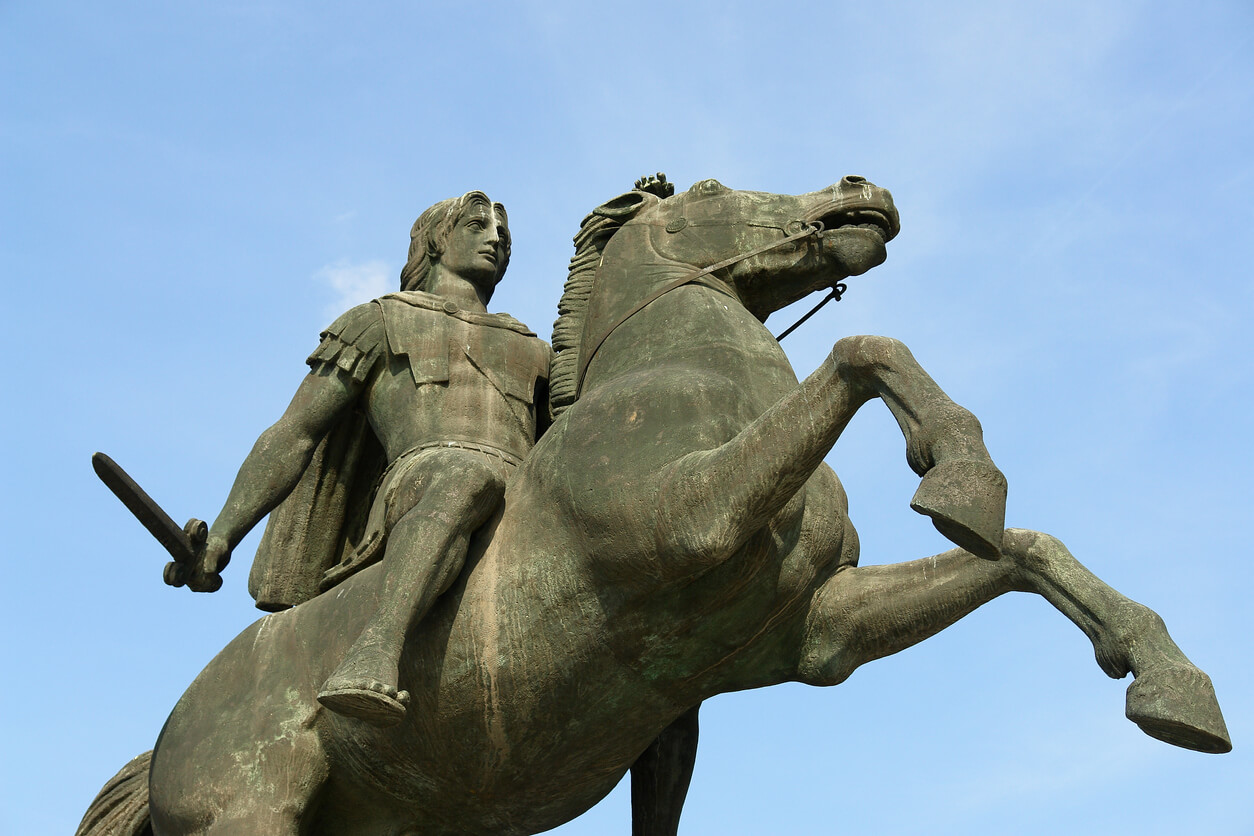The Origin and Meaning of the Name Alexander

If you’re looking for a name for your baby that conveys power and security, in your list of favorites, there’s one that can’t be missing: Today, we’ll tell you the origin and meaning of the name Alexander.
First of all, you should know that it’s a quite popular name in Spain. According to the Spanish National Statistics Institute (INE), there are 15,176 people registered with the name Alexander in that country alone. In the US, there are an estimated 560,406 individuals with this name.
History, mythology, and religion are great sources of inspiration for the choice of a name. So, here we’re going to learn more about this wonderful name, which has a little bit of everything.
What’s the meaning of the name Alexander?
Alexander comes from the Greek word Alexandros, composed of alexo, which means ‘to defend’, and andros, which means ‘man’. By the union of both words, Alexander is interpreted as ‘the protector or defender of men’ .
At the same time, the name also has a biblical meaning, as it appears in the Holy Scriptures, where it’s interpreted as ‘the one who helps men’.
The origin of Alexander, a historical and classic name
Alexander is an Anglo-German name whose origin is Alexandros, a well-known masculine name used in Ancient Greece.
Although it’s of Greek origin – spelled Αλέξανδρος-, the character that led this name to transcend over time was Alexander the Great, the strategist and military leader who was king of Macedonia and of a great empire that occupied an extensive territory from Greece to the Indian subcontinent.
His travels were driven by a thirst for conquest, but also aroused scientific interest as he encountered flora and fauna unknown in Europe, such as plants that were harnessed for medicinal use. In addition, Alexander the Great left the imprint of classical culture in many territories of Central Asia and the Middle East.
“He spread Greek culture which, fused with the cultures of the subjugated regions, permeated language, politics, art, literature, and religion. Ultimately he changed the world of his time.” -Historia NG España-

Alexander as a saint
As a consequence of the great prominence that this name acquired throughout the centuries, the dates of commemoration of Saint Alexander are diverse and vary according to the country. Below, we’ll share some of them:
- Pope Alexander I Alexandria (patriarch) – Saint Alexander of Alexandria: February 26.
- Alexander of Jerusalem – Saint Alexander of Jerusalem: March 18.
- Alexander of Lyon – Saint Alexandre of Lyon: April 24.
- Alexander of Bergamo – Saint Alexander of Bergamo: August 26th.
- Alexander of Constantinople – Saint Alexander of Constantinople: August 28.
- Alexander of Sauli – Saint Alexander of Sauli: November 6th.
Alexander in other languages
Probably, the fame of Alexander the Great made this name popular in many countries, from Europe to the Middle East. If you want to consider a more exotic variant for your child, here are several options:
- Greek: Alexandros
- Arabic: Iskandar
- Bulgarian: Aleksandar
- Catalan / French: Alexandre, Alex
- Czech: Alexandr, Ales
- Belarusian: Aliaksandr
- Spanish: Alejandro
- Basque: Alesander
- Italian: Alessandro
- Portuguese: Alexandre, Xandinho
There are also short variants used as names such as Alex, Ale, and Sandro. The latter is very popular in Italy.

Famous people with the name Alexander
- Alexander Dumas: French novelist, writer, and playwright. Author of The Count of Monte Cristo and The Three Musketeers, among other works.
- Alexander Franz: Hungarian psychoanalyst who’s considered one of the founders of psychoanalytic criminology.
- Alexander Fleming: British bacteriologist, physician, and scientist, famous for the discovery of penicillin.
- Alexander Graham Bell: Scientist and inventor of the telephone.
- Alexander Ludwig: Canadian actor, singer, and model. Star of The History Channel’s hit series Vikings.
- Alexander McQueen: British clothing designer.
- Alexander Meliss: Famous YouTuber known as Meli.
- Alexander Popov: Russian swimmer. He was the star of the Olympic Games in Seville in 1992 and Atlanta in 1996.
- Alexander Rodchenko: Russian visual artist, graphic designer, and photographer.
- Alexander Skarsgard: Swedish actor, star of the 2016 film The Legend of Tarzan.
- Alexander von Humboldt: German naturalist and explorer. He’s considered one of the fathers of geography.
- Alexander Zverev: German tennis player of Russian origin.
Origin and meaning of the name Alexander: Warrior and powerful
The name Alexander is a name that invokes a great temperament, leadership, protection, and a strong commitment to other people.
The lineage of this name is exciting, as it was worn by warriors, representatives of the people, church preachers, scientists, singers, filmmakers, writers, and countless important people worldwide.
Now that you’re clear about the origin and meaning of Alexander, you have two options: Either you choose it for your child or you keep looking for the right name. If you choose the latter, we offer you more options to explore. On our site, you’ll find all kinds of lists of very interesting names!
If you want to continue with names from classical antiquity, take a look at the selection of Greek names. On the other hand, if you’re looking for something more modern and avant-garde, maybe some original names can provide you with the solution.
Now, what name are you going to choose for your child?
If you’re looking for a name for your baby that conveys power and security, in your list of favorites, there’s one that can’t be missing: Today, we’ll tell you the origin and meaning of the name Alexander.
First of all, you should know that it’s a quite popular name in Spain. According to the Spanish National Statistics Institute (INE), there are 15,176 people registered with the name Alexander in that country alone. In the US, there are an estimated 560,406 individuals with this name.
History, mythology, and religion are great sources of inspiration for the choice of a name. So, here we’re going to learn more about this wonderful name, which has a little bit of everything.
What’s the meaning of the name Alexander?
Alexander comes from the Greek word Alexandros, composed of alexo, which means ‘to defend’, and andros, which means ‘man’. By the union of both words, Alexander is interpreted as ‘the protector or defender of men’ .
At the same time, the name also has a biblical meaning, as it appears in the Holy Scriptures, where it’s interpreted as ‘the one who helps men’.
The origin of Alexander, a historical and classic name
Alexander is an Anglo-German name whose origin is Alexandros, a well-known masculine name used in Ancient Greece.
Although it’s of Greek origin – spelled Αλέξανδρος-, the character that led this name to transcend over time was Alexander the Great, the strategist and military leader who was king of Macedonia and of a great empire that occupied an extensive territory from Greece to the Indian subcontinent.
His travels were driven by a thirst for conquest, but also aroused scientific interest as he encountered flora and fauna unknown in Europe, such as plants that were harnessed for medicinal use. In addition, Alexander the Great left the imprint of classical culture in many territories of Central Asia and the Middle East.
“He spread Greek culture which, fused with the cultures of the subjugated regions, permeated language, politics, art, literature, and religion. Ultimately he changed the world of his time.” -Historia NG España-

Alexander as a saint
As a consequence of the great prominence that this name acquired throughout the centuries, the dates of commemoration of Saint Alexander are diverse and vary according to the country. Below, we’ll share some of them:
- Pope Alexander I Alexandria (patriarch) – Saint Alexander of Alexandria: February 26.
- Alexander of Jerusalem – Saint Alexander of Jerusalem: March 18.
- Alexander of Lyon – Saint Alexandre of Lyon: April 24.
- Alexander of Bergamo – Saint Alexander of Bergamo: August 26th.
- Alexander of Constantinople – Saint Alexander of Constantinople: August 28.
- Alexander of Sauli – Saint Alexander of Sauli: November 6th.
Alexander in other languages
Probably, the fame of Alexander the Great made this name popular in many countries, from Europe to the Middle East. If you want to consider a more exotic variant for your child, here are several options:
- Greek: Alexandros
- Arabic: Iskandar
- Bulgarian: Aleksandar
- Catalan / French: Alexandre, Alex
- Czech: Alexandr, Ales
- Belarusian: Aliaksandr
- Spanish: Alejandro
- Basque: Alesander
- Italian: Alessandro
- Portuguese: Alexandre, Xandinho
There are also short variants used as names such as Alex, Ale, and Sandro. The latter is very popular in Italy.

Famous people with the name Alexander
- Alexander Dumas: French novelist, writer, and playwright. Author of The Count of Monte Cristo and The Three Musketeers, among other works.
- Alexander Franz: Hungarian psychoanalyst who’s considered one of the founders of psychoanalytic criminology.
- Alexander Fleming: British bacteriologist, physician, and scientist, famous for the discovery of penicillin.
- Alexander Graham Bell: Scientist and inventor of the telephone.
- Alexander Ludwig: Canadian actor, singer, and model. Star of The History Channel’s hit series Vikings.
- Alexander McQueen: British clothing designer.
- Alexander Meliss: Famous YouTuber known as Meli.
- Alexander Popov: Russian swimmer. He was the star of the Olympic Games in Seville in 1992 and Atlanta in 1996.
- Alexander Rodchenko: Russian visual artist, graphic designer, and photographer.
- Alexander Skarsgard: Swedish actor, star of the 2016 film The Legend of Tarzan.
- Alexander von Humboldt: German naturalist and explorer. He’s considered one of the fathers of geography.
- Alexander Zverev: German tennis player of Russian origin.
Origin and meaning of the name Alexander: Warrior and powerful
The name Alexander is a name that invokes a great temperament, leadership, protection, and a strong commitment to other people.
The lineage of this name is exciting, as it was worn by warriors, representatives of the people, church preachers, scientists, singers, filmmakers, writers, and countless important people worldwide.
Now that you’re clear about the origin and meaning of Alexander, you have two options: Either you choose it for your child or you keep looking for the right name. If you choose the latter, we offer you more options to explore. On our site, you’ll find all kinds of lists of very interesting names!
If you want to continue with names from classical antiquity, take a look at the selection of Greek names. On the other hand, if you’re looking for something more modern and avant-garde, maybe some original names can provide you with the solution.
Now, what name are you going to choose for your child?
All cited sources were thoroughly reviewed by our team to ensure their quality, reliability, currency, and validity. The bibliography of this article was considered reliable and of academic or scientific accuracy.
- Instituto Nacional de Estadística de España. Cuantos se llaman… Disponible en: https://www.ine.es/widgets/nombApell/index.shtml
- National Geographic (s.f.) Personajes. Alejandro Magno. Disponible en: https://historia.nationalgeographic.com.es/personajes/alejandro-magno
- National Geographic (2021) Alejandro Magno, conquistador de la India. Disponible en: https://historia.nationalgeographic.com.es/a/alejandro-magno-conquistador-india_7693
- Salazar, S. (2016). El gran libro de los nombres para tu bebé. Guía ilustrada de nombres para niño y niña. Barcelona: Planeta.
This text is provided for informational purposes only and does not replace consultation with a professional. If in doubt, consult your specialist.








